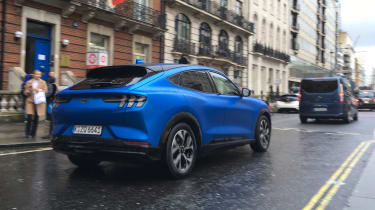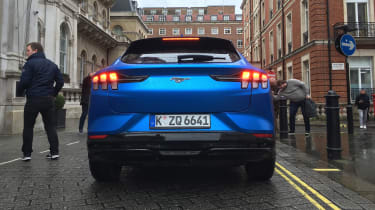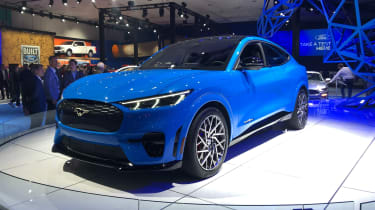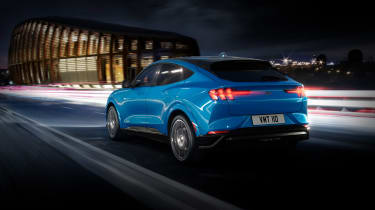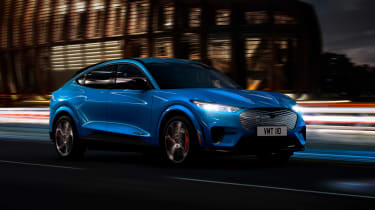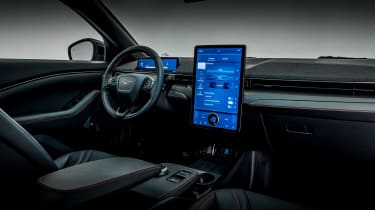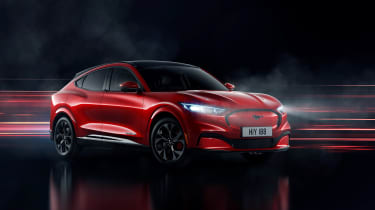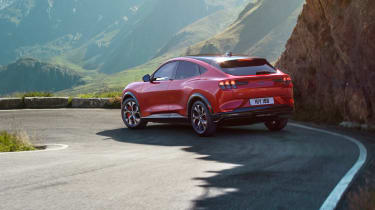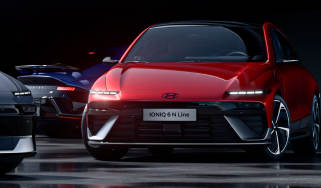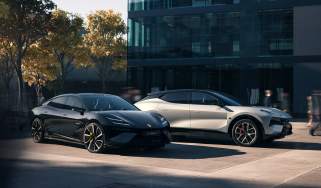Ford Mustang Mach-E makes UK debut
Electric SUV gets a famous name and up to 370 miles of WLTP range – and we go for a ride
It’s happened. First came SUVs from Porsche, Maserati and Lamborghini, then coupé nameplates like the Mitsubishi Eclipse and Ford Puma were applied to taller vehicles. Now, it’s the turn of the Ford Mustang to become an SUV, and an all-electric one at that.
Though the muscle car we all love will remain on sale, the Mustang Mach-E marks the beginning of a new range of practical EVs from the US marque. Similar in size to a Porsche Macan – it’s 31mm longer, 42mm narrower and 27mm lower – the Mach-E will come with different battery sizes, drivetrain layouts and power outputs, and will start at a very competitive price: £40,270
Mustang Mach-E design and conception
Darren Palmer, global product development director of Ford’s EV models, told evo that Ford pulled together a whole new team when it began development of the Mach-E, doing away with the hierarchical structure found throughout the rest of the company, and adopting more of a collaborative “startup” environment.
The team quickly came to the conclusion that an electric vehicle had to be aspirational – something consumers would buy even if regulations weren’t forcing them into it. Engineers were initially working on a replacement for Ford’s original, low-volume Focus Electric, but the plan was quickly shelved when the idea of an electric Mustang was suggested as inspiration.
While an SUV silhouette was quickly settled upon – a market segment whose popularity shows no signs of abating – the idea of an electric Mustang never left. According to Palmer, the first design sketches were the work of an all-weekender by the design team, inspired by the Mustang idea, while every department was given the task of creating something new rather than falling back on prior knowledge.
The resulting shape is more complex than simply being a Mustang on stilts, but the team’s inspiration ensures plenty of design cues from the current Mustang have made it across to the Mach-E – albeit reprofiled to suit the car’s taller shape and five-seat cabin.
Unique touches abound. The doorhandles are operated by a button that can, if necessary, be pressed by your elbow if your hands are full, and pulled open by small “winglets”, and won’t shut if a child’s fingers are in the jamb. The “frunk” under the bonnet, enabled by the absence of an engine, is washable and has a drainage hole so active types can stash wetsuits, muddy boots, coolers and the like without dragging dampness and mud into the cabin.
More common Mustang touches appear in the design though, linking it to the V8-engined coupe through its detailing and various signature elements like the rear haunches and tense, muscular surfacing. Mustang badges replace Ford ones, the blanked-off grille keeps the shape of the pony car, and the tri-bar rear lights are another recognisable touch. You even get Mustang puddle lights, while in the cabin, the dashboard retains the two “eyebrows” that have been a Mustang signature since the earliest model – but they’re now an integrated B&O sound system.
The main focus inside is the Tesla-esque 15.5-inch touchscreen, aiming to minimize the number of physical buttons in the cabin to simplify the user experience. Should you spec the technology package, you’ll receive features such as an uprated ten-speaker B&O sound system, Advanced Active Park Assist and Active Drive Assist with Lane Centring.
Mustang Mach-E drivetrain
Two battery pack sizes, three power outputs and both RWD and AWD variants will be initially available, but Ford has confirmed it will launch a ‘GT’ performance version, likely to rival the 402bhp Mercedes-Benz EQC and Audi E-tron in the future. Murat Gueler, chief designer for Ford of Europe, told evo’s sister title Auto Express that the brand is targeting a sub-five-second 0-62mph time and a power output of 458bhp and 612lb ft of torque for the range-topper.
The base level Mach-E offers only a single-motor, RWD set-up, with the smallest 75kWh battery pack offering 255bhp, and the 99kWh pack 281bhp, both sitting at 315lb ft of torque for a 0-62mph time in under eight seconds. Though this is the base model, it boasts the most range of the offerings – either 280 or 370 miles (WLTP) depending on the size of the battery pack.
It’s worth remembering that real-world range will likely be a little lower, and in America the EPA’s own estimates (generally more realistic than European numbers) vary between 230 miles and 300 miles. But the bare numbers mean the Mach-E will be one of the longest-range electric cars on the market.
The only cars that get close or exceed the 99kWh Mach-E’s WLTP figures are the top-end Tesla Model S and Model 3, at 379 and 348 miles, and the Tesla Model X at 314 miles. Jaguar’s i-Pace only marginally beats the 75kWh Mustang at 292 miles, while the Kia and Hyundai trio of e-Niro, Soul EV and Kona Electric are the only affordable models nearby with ranges all around the 280-mile mark.
Move up the range and you’ll find a dual-motor, AWD variant, with either 75 or 99kWh battery packs for 260 or 335 miles of WLTP range, a more substantial 429lb ft of torque and 254 or 332bhp respectively. Specifics on performance are yet to be provided, but a sub-seven-second 0-62mph time is quoted, with weight sitting at a hefty 2218kg for the 99kWh variant.
All cars have a 111mph top speed, and the batteries are warranted for eight years or 100,000 miles.
Mustang Mach-E chassis
The enemy of most electric cars, thanks to large, heavy battery packs, is weight. Ford doesn’t quote official figures for the Mach-E yet, but speaking to an engineer, we were told that the car will come in between around two metric tons at the lower end of the scale (a rear-drive car with the smaller battery) to about 2.2 tons at the upper end.
That’s broadly similar to a number of electric cars currently on sale, though many of the other electric SUVs are even heavier than that. Such mass will always limit the outright capabilities of a car like the Mustang Mach-E, but Ford is confident its work on the car’s chassis will still make for an entertaining car to drive.
The suspension setup, for example, is being targeted just below what Ford would set for an ST-Line model in its range, with more precision and body control than a standard model might offer, but ensuring the suspension can take the edge off bumps – important in a car likely to spend at least some of its life in urban environments, and for one designed for families.
Surprisingly, the car actually uses a passive suspension setup for its MacPherson strut front and multi-link rear, with no adjustment to the dampers. This was dictated partly by cost (the upcoming, more expensive Mach-E GT should revert to active dampers) but also because Ford is confident it can achieve the handling and ride balance it desires with a more conventional setup. European models will be tuned slightly differently from those in the US, to take account of different road surfaces, weather, and typical tyre choices.
Most intriguing is that Ford also tells us it’s given the car a handling balance typical of its European models. Drive any Fiesta or Focus with aplomb and you’ll notice a high degree of throttle adjustability to the chassis, rotating around a point somewhere in the centre of the car. This should apply to the Mach-E too, though given the car’s wide remit, we expect power-oversteer from the RWD and AWD setups has been dialled back to safe levels.
Mustang Mach-E passenger ride
Ford launched the Mustang Mach-E to a European audience at the first of its Go Electric experiences in February, in central London. We were able to get a ride in a prototype version of the car, but while some settings are yet to be signed off and the car we experienced wasn’t up to full quality and trim standards, it was nevertheless enlightening.
Naturally, it’s quiet. Active sounds are yet to be implemented – Ford promises it’s chosen something appropriate to the car, after effectively remixing the sounds of the electric motors themselves – so this car was effectively silent. Not only is drivetrain noise low, but the cabin seems to insulate sounds well too, so the bustle of London traffic was kept to a minimum.
The cabin feels airy thanks to the pared-back dash, and the 15.5-inch central screen appears better in reality, as many do, than it does in pictures – and a physical control knob embedded into the screen is a nice touch. A small display behind the chubby steering wheel (it’s a smaller, less dished wheel than the sports car) gives the driver their own information, so there’s no Tesla Model 3 minimalism here.
Similarly-sized to a Porsche Macan, the Mach-E appears to have a similar seating position too, though Ford seems to have prioritised interior space (which feels more generous than the Porsche) over luggage space in the rear boot – with 402 litres behind and that 100-litre cubby in the nose, overall luggage space is almost identical to the Porsche.
Immediately noticeable is a calm ride, which seems free of harshness over bumps and through potholes. A slight pitching motion under acceleration and braking highlights the softer-than-ST setup, but with comfortable seats, it should prove little problem for families.
Its more dynamic side though is something we couldn’t experience in London, beyond a brief acceleration run in an underground carpark and a small slalom on the way back - but Ford has a fairly good handle on handling, so we’re looking forward to trying the Mach-E for real towards the end of 2020.
Mustang Mach-E pricing
£40,270 will afford you the base-level Mach-E, with the AWD carrying a £6000 premium and the limited-run First Edition, which has already sold out incidentally, costing from £58,000. Those numbers put the Mustang between the Hyundai and Kia offerings at the lower end, and cars like the Mercedes-Benz EQC and Audi e-tron further up - while the base Mach-E is on-par with an entry-level Tesla Model 3.
Orders can be made only on the brand’s online marketplace, and first cars are set to hit UK shores in late 2020


